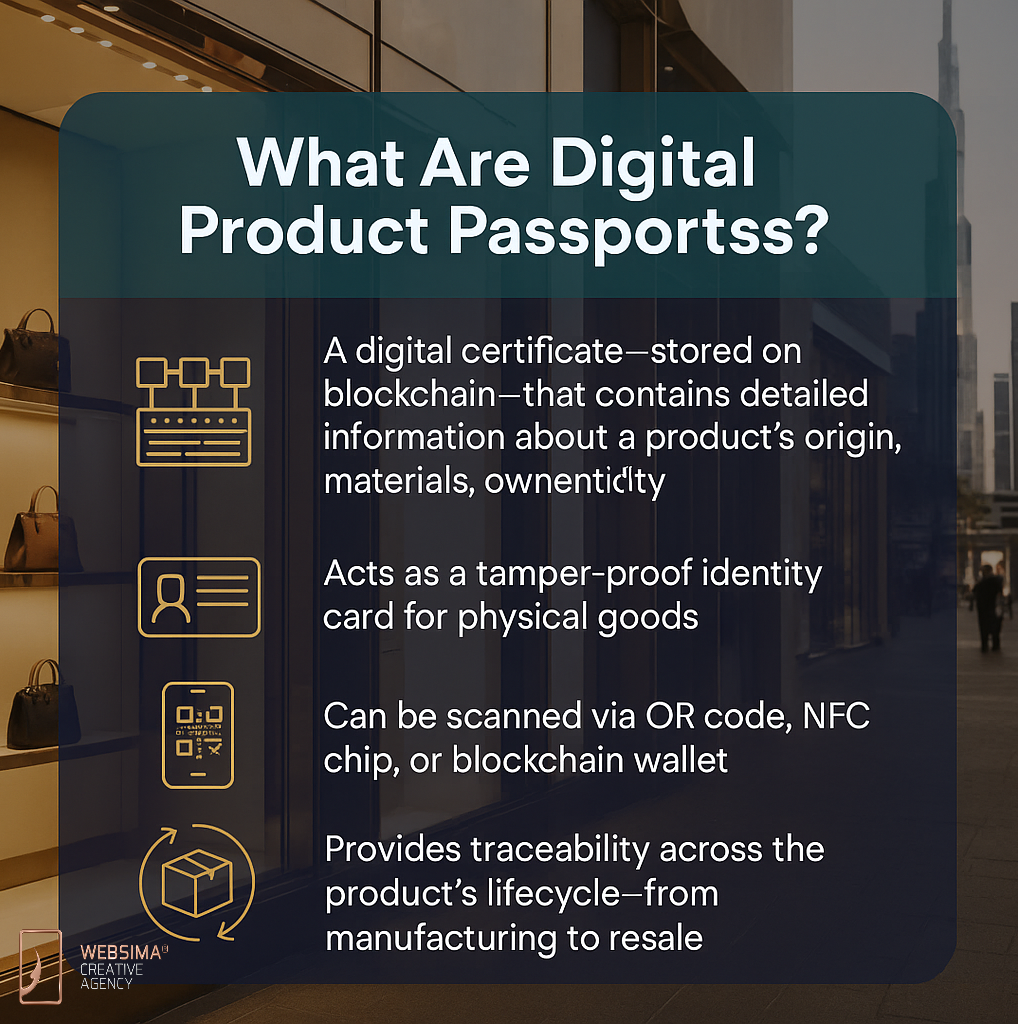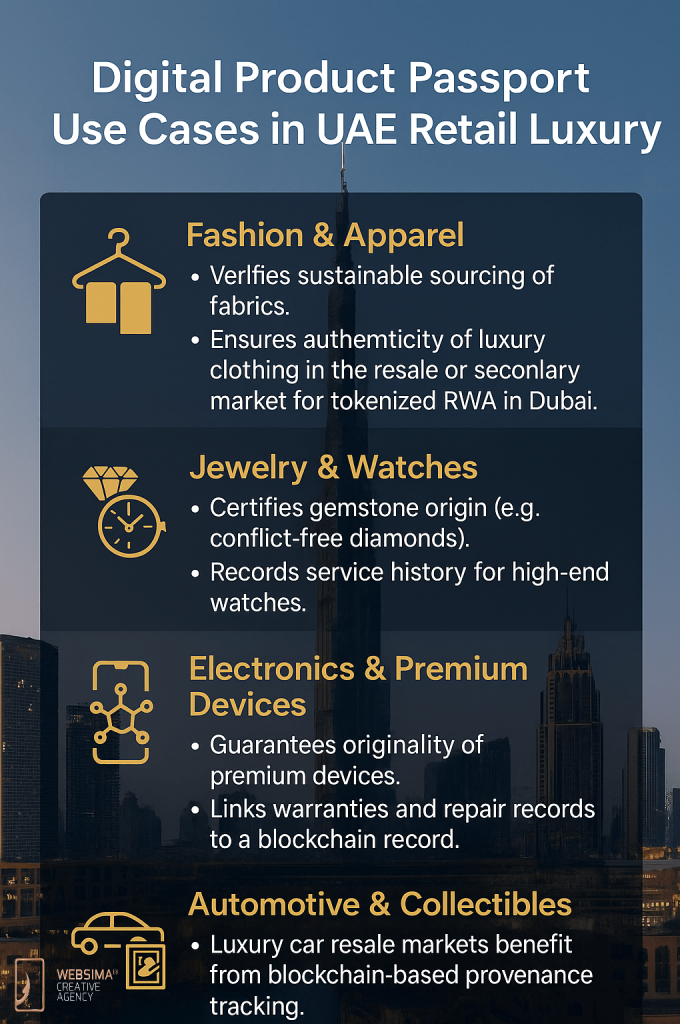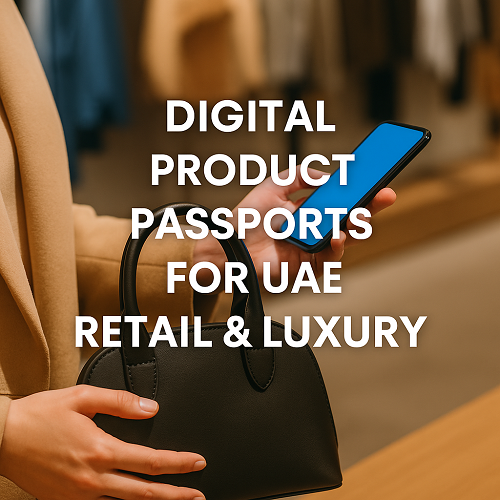Table of Contents
- Introduction
- What Are Digital Product Passports?
- Why the UAE Is Adopting Digital Product Passports
- Dubai’s Push for Blockchain Adoption
- Consumer Protection & Anti-Counterfeit Measures
- Alignment with Global Sustainability Standards
- How Digital Product Passports Work
- Blockchain Traceability
- Ownership & Resale Authentication
- Customer Engagement & Loyalty Programs
- Digital Product Passport Use Cases in UAE Retail & Luxury
- Fashion & Apparel
- Jewelry & Watches
- Electronics & Premium Devices
- Automotive & Collectibles
- Case Study: Digital Product Passports in Global Luxury Retail
- Benefits for UAE Businesses and Consumers
- Risks & Challenges of Digital Product Passports
- Mistakes to Avoid for UAE Businesses
- Regulatory Outlook in Dubai & the UAE
- Future of Digital Product Passports in the Luxury Sector
- Frequently Asked Questions (FAQs)
- Final Thoughts
- Partner with Websima
Introduction
Dubai and Abu Dhabi are rapidly becoming global centers for blockchain innovation. From tokenized real estate to NFT-based art authentication, the UAE is positioning itself as a leader in digital trust frameworks. The next frontier is the adoption of digital product passports (DPPs)—blockchain-powered certificates that verify a product’s origin, authenticity, and lifecycle.
#IOTA has made 50x from the corona crash – within 399 days.
Without:
EVM
dApps
IOTA 2.0 (coordicide) on working testnet
Web3 ID Solution
A staging network
RWA Accelerator Program
A Digital Product Passport solution
Headquarter in the UAE
… and…— IOTAmania (@IOTAmania) August 4, 2024
The concept of a digital product passport UAE is particularly relevant for luxury brands, fashion retailers, and premium goods markets. In an economy where counterfeits account for nearly USD 467 billion in global trade (OECD), the UAE is leveraging blockchain to ensure authenticity and strengthen consumer confidence.
What Are Digital Product Passports?
A digital product passport is a digital certificate—stored on blockchain—that contains detailed information about a product’s origin, materials, ownership history, and authenticity.

- Acts as a tamper-proof identity card for physical goods.
- Can be scanned via QR code, NFC chip, or blockchain wallet.
- Provides traceability across the product’s lifecycle—from manufacturing to resale.
For UAE consumers, this ensures that every luxury handbag, watch, or jewelry piece purchased in Dubai carries verifiable proof of authenticity.
Why the UAE Is Adopting Digital Product Passports
Dubai’s Push for Blockchain Adoption
The UAE government launched the Dubai Blockchain Strategy, aiming to make 50% of government transactions blockchain-based by 2030 (Digital Dubai). Retail and luxury markets are natural extensions of this vision.
Consumer Protection & Anti-Counterfeit Measures
Dubai is one of the world’s largest luxury shopping hubs. Protecting consumers from counterfeit goods not only safeguards buyers but also boosts the emirate’s reputation as a trusted luxury marketplace.
Alignment with Global Sustainability Standards
The EU will require digital product passports for textiles, electronics, and automotive goods by 2030. The UAE is preparing to align with these global standards, ensuring its exports and retail ecosystem remain competitive (UAE Government Blockchain Overview).
How Digital Product Passports Work
Blockchain Traceability
Each product is linked to a blockchain entry, ensuring tamper-proof transparency.
Ownership & Resale Authentication
When a consumer resells a luxury item, ownership transfer is recorded on-chain—boosting resale value and preventing fraud.
Customer Engagement & Loyalty Programs
To incorporate Web3 loyalty programs in UAE, brands can embed loyalty points, personalized offers, and aftercare services into the digital passport, creating direct communication channels with customers.
Digital Product Passport Use Cases in UAE Retail & Luxury

Fashion & Apparel
- Verifies sustainable sourcing of fabrics.
- Ensures authenticity of luxury clothing in the resale or secondary market for tokenized RWA in Dubai.
Jewelry & Watches
- Certifies gemstone origin (e.g., conflict-free diamonds).
- Records service history for high-end watches.
Electronics & Premium Devices
- Guarantees originality of premium devices.
- Links warranties and repair records to a blockchain record.
Automotive & Collectibles
- Luxury car resale markets benefit from blockchain-based provenance tracking.
- Collectibles (art, rare sneakers) maintain verifiable authenticity.
Case Study: Digital Product Passports in Global Luxury Retail
Luxury brands such as LVMH, Prada, and Cartier launched the Aura Blockchain Consortium, which issues blockchain-based digital product passports for high-value goods.
Early adoption shows:
- Improved resale value of authenticated items.
- Higher consumer loyalty in markets with strong counterfeit risks.
This global precedent positions Dubai as a natural adopter of the technology for luxury retail.
Benefits for UAE Businesses and Consumers
- Trust & Transparency: Eliminates counterfeit risks.
- Higher Resale Value: Secondary markets thrive with verifiable ownership.
- Sustainable Brand Positioning: Traceability of materials enhances ESG alignment.
- Customer Loyalty: Personalized rewards and direct engagement channels.
Risks & Challenges of Digital Product Passports
- Implementation Costs: NFC chips, blockchain infrastructure, and staff training.
- Consumer Education: Many shoppers are unfamiliar with blockchain.
- Interoperability: Need for unified standards across industries.
Mistakes to Avoid for UAE Businesses
- Treating DPPs as a “marketing gimmick” instead of a serious digital asset.
- Ignoring integration with resale platforms—a key value driver.
- Overcomplicating the consumer interface.
Regulatory Outlook in Dubai & the UAE
The UAE is building a pro-innovation regulatory environment:
- VARA (Virtual Assets Regulatory Authority) oversees digital assets and blockchain applications.
- Consumer protection laws and alignment with EU DPP regulations will shape adoption.
Future of Digital Product Passports in the Luxury Sector
Over the next five years, digital product passports will:
- Become a default standard for luxury goods in Dubai Mall, Yas Mall, and other retail hubs.
- Expand into sustainability reporting, linking carbon footprints and repair histories to each product.
- Support Dubai’s ambition to be a global leader in blockchain-powered retail innovation.
Frequently Asked Questions (FAQs)
Q1: What is a digital product passport?
A blockchain-based certificate verifying product authenticity, ownership, and lifecycle.
Q2: Why are digital product passports important in the UAE?
They prevent counterfeits, enhance resale markets, and strengthen Dubai’s luxury reputation.
Q3: How do customers use them?
By scanning a QR code or NFC chip embedded in the product.
Q4: Will digital product passports be mandatory in Dubai?
Not yet, but EU regulations suggest adoption will become widespread to maintain trade competitiveness.
Q5: Which industries benefit most?
Luxury fashion, jewelry, electronics, and automotive.
Final Thoughts
The digital product passport UAE initiative signals a shift in how retailers and luxury brands manage authenticity, sustainability, and consumer trust. With blockchain, every product carries a verifiable identity—unlocking new opportunities for resale markets, loyalty programs, and ESG alignment.
As global luxury players embrace digital passports, the UAE is well-positioned to lead adoption in the Middle East, reinforcing its reputation as a forward-looking retail hub.
Partner with Websima
At Websima, we help UAE businesses transition into the digital future by building blockchain-powered platforms for retail, luxury, and beyond.
From smart contract development to digital product passport integration, our solutions empower brands to fight counterfeits, build trust, and unlock new customer engagement models.
Get in touch with Websima to explore how digital product passports can future-proof your retail or luxury business in Dubai.





